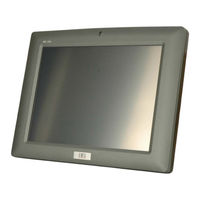IEI Technology AFL-xxA-N270 series PC Manuals
Manuals and User Guides for IEI Technology AFL-xxA-N270 series PC. We have 2 IEI Technology AFL-xxA-N270 series PC manuals available for free PDF download: User Manual
IEI Technology AFL-xxA-N270 series User Manual (182 pages)
fanless all-in-one panel pc with 1.6 GHz Intel Atom Processor TFT LCD, Wireless LAN, Touch Screen, RS-232/422/485 and IP 64 Protection
Brand: IEI Technology
|
Category: Touch Panel
|
Size: 9 MB
Table of Contents
-
-
-
Front Panel20
-
Rear Panel20
-
-
-
-
System Power35
-
3 Unpacking
38-
Npacking39
-
Packing List40
-
-
-
-
Arm Mounting63
-
-
-
-
Wireless Driver133
-
-
-
E Watchdog Timer
176-
Example Program178
-
Advertisement
IEI Technology AFL-xxA-N270 series User Manual (171 pages)
Fanless All-in-One panel PC with 1.6 GHz Intel Atom Processor FTF LCD, Wireless Lan, Bluetooth, Touch Screen
Brand: IEI Technology
|
Category: Touch Panel
|
Size: 9 MB
Table of Contents
-
-
-
Applications18
-
-
-
-
Front Panel19
-
Rear Panel19
-
-
-
-
-
System Power35
-
3 Unpacking
39-
Npacking40
-
Packing List41
-
-
-
-
Arm Mounting65
-
-
-
Main83
-
Advanced84
-
Type [Auto]89
-
Zip89
-
Auto]92
-
System Time102
-
Serial Port Mode103
-
Terminal Type103
-
IRQ# [Available]107
-
Pci/Pnp107
-
Boot109
-
Security112
-
Chipset113
-
Exit117
-
-
-
Bluetooth Driver140
-
-
-
Wireless Driver144
-
Advertisement
Related Products
- IEI Technology AFL-xxx-9103
- IEI Technology AFL-xxx-CX2
- IEI Technology AFLLX Series
- IEI Technology AFL2-W15A-N270
- IEI Technology AFL-17C-9652
- IEI Technology AFL2-W19AB-H61-i3/R-R11
- IEI Technology AFL4-W133-ADLP-i7/8G
- IEI Technology AFL4-W10-EHL
- IEI Technology AFL2-W19A-H61-i3/PC-R11
- IEI Technology AFL2-W15A-N270/R-EM/1G-R20

